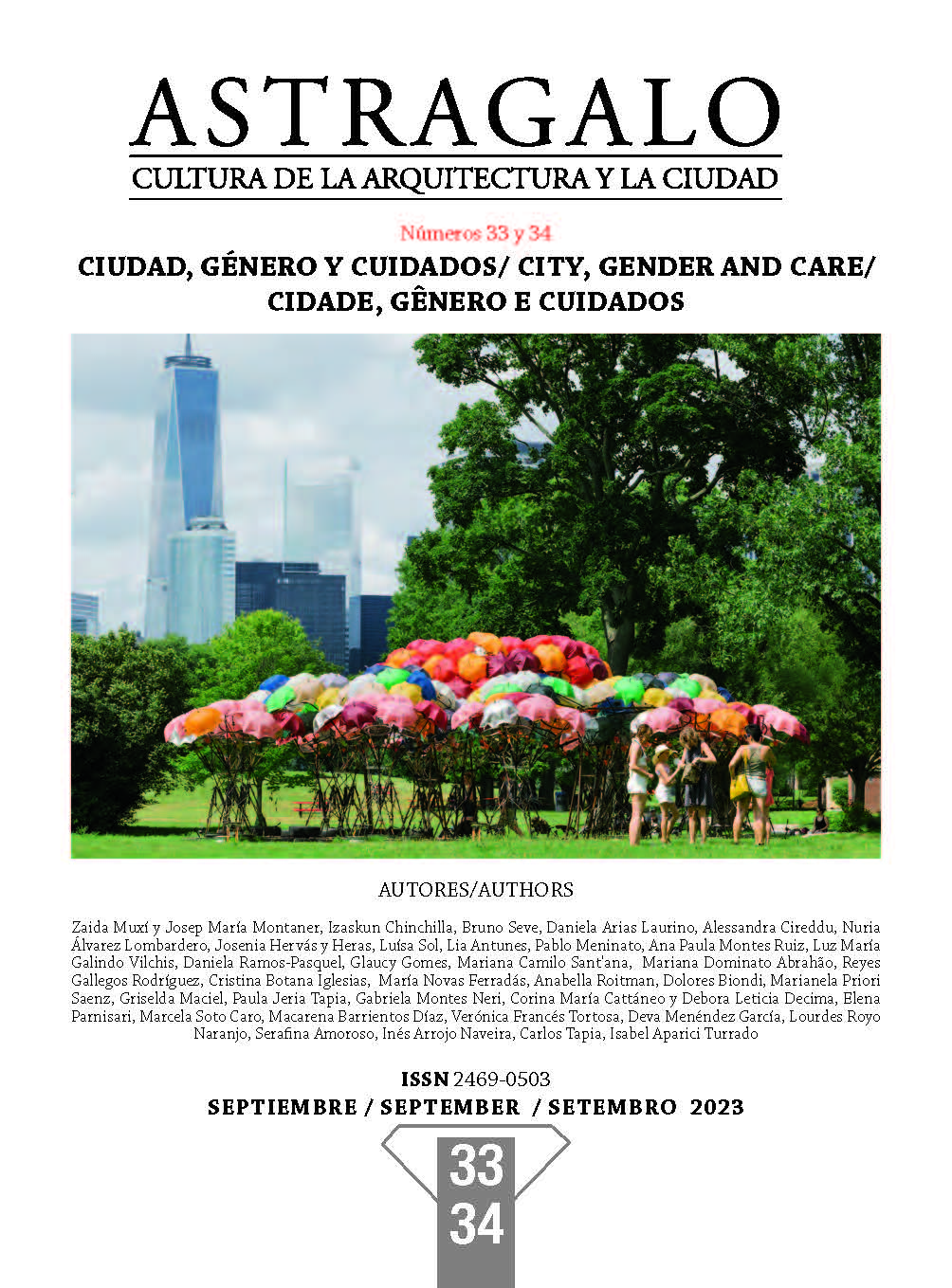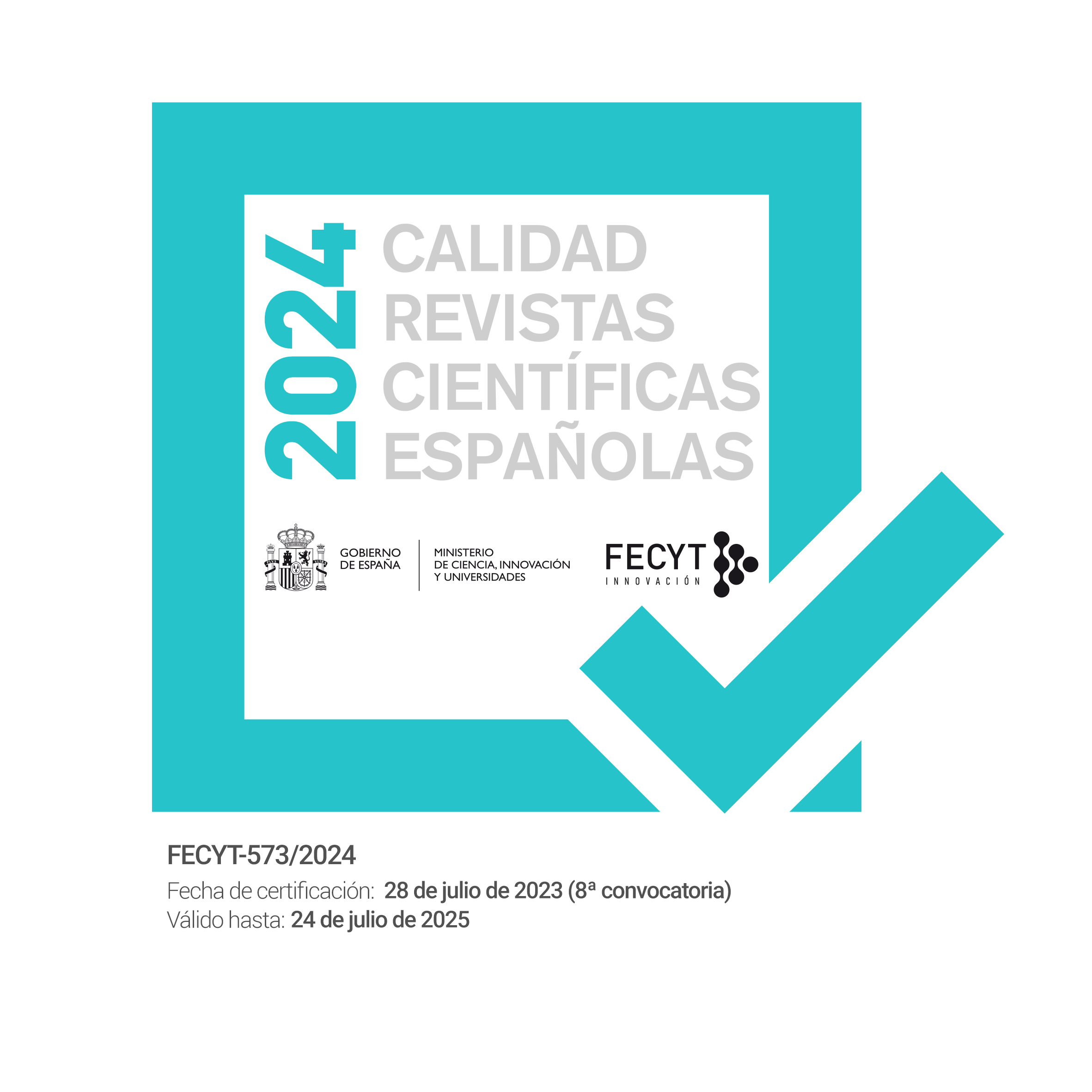¿Mi sueño? Tener una casa.
Pensar sobre vivienda, ciudad y ciudadanía de las mujeres en el Portugal revolucionario (1974-1976)
DOI:
https://doi.org/10.12795/astragalo.2023.i33-34.08Palabras clave:
proceso SAAL, política pública de vivienda, participación, ciudadanía de las mujeres, PortugalResumen
El Servicio de Apoyo Ambulatorio Local (SAAL, 1974-76)) fue una iniciativa única en la cultura arquitectónica portuguesa, sobre todo por la dimensión sociopolítica de la disputa por la casa y la ciudad de las vecinas pobres urbanas. Las mujeres fueron protagonistas. Exploro las motivaciones y contribuciones de vecinas y técnicas en el desarrollo del SAAL/Norte. Desde el programa televisivo Nome Mulher (“Nombre Mujer”, 1975-1976), pregunto por la relación entre la lucha por el derecho a la vivienda y la construcción de la ciudadanía de las mujeres en el marco de la participación en el SAAL. Metodológicamente, el listado de los temas del programa se coloca en línea con el episodio Direito à Habitação (“Derecho a la Vivienda”, 1976), donde una arquitecta y vecinas de SAAL/Norte hablan en primera persona.
El análisis interseccional del grupo “mujeres del proceso SAAL” sigue la discusión de las estructuras sexuales y raciales; Carol Pateman (2010) subraya los principales obstáculos para la construcción de la “ciudadanía plena” de las mujeres: la feminización de la pobreza, la infrarrepresentación y la atribución social e histórica del trabajo de cuidados a las mujeres. Estos tienen el potencial de ser entendidos como “gestos políticos radicalmente subversivos” (hooks, 1990). El derecho a la vivienda está conectado al derecho a ser parte activa de la sociedad (Muxi, 2009) y al derecho a la ciudad, concepto que ha sido ampliado por los feminismos (Pérez, 2013). Planteo que el acceso a la vivienda - digna, adecuada y lugar de individualidad y descanso - es un pilar en la realización de la ciudadanía plena de las mujeres.
Descargas
Citas
Bandeirinha, José António. 2011. O Processo SAAL e a Arquitectura no 25 de Abril de 1974. Reimpressão 2011. Coimbra: Imprensa da Universidade de Coimbra. doi:10.14195/978-989-26-1265-2.
Bebiano, Adriana, e Maria Irene Ramalho. 2010. «Estudos feministas e cidadania plena». Revista Crítica de Ciências Sociais [Online], n.o 89: 5–10. doi:10.4000/rccs.3659.
Colling, Ana Maria, e Losandro Antonio Tedeschi, eds. 2019. Dicionário Crítico de Género. 2a. Feminismos Plurais. Dourados, MS: Ed. Universidade Federal da Grande Dourados UFGD. https://www.ufgd.edu.br/setor/editora/catalogo.
Conselho Nacional do SAAL. 1976. Livro Branco do SAAL 1974-1976. Vila Nova de Gaia: Conselho Nacional do SAAL.
Costa, Ana Alves, Ana Catarina Costa, e Sergio Fernandez, eds. 2019. Cidade Participada: Arquitectura e Democracia - S. Victor. Vol. 2. Lisboa: Tinta-da-china.
Costa, Ana Alves, e Sergio Fernandez, eds. 2020. Cidade Participada: Arquitectura e Democracia - Antas, Pedro Ramalho. Vol. 3. Lisboa: Tinta-da-china.
Costa, Ana Catarina. 2022. «O campo da arquitectura na construção da cidade democrática: Processo SAAL/Porto». Tese de Doutoramento em Arquitectura, Porto: Faculdade de Arquitectura da Universidade do Porto.
Costa, Miguel Reimão, e Ana Alves Costa, eds. 2022. Cidade Participada: Arquitectura e Democracia. Operações SAAL. Algarve. Vol. 4. Lisboa: Tinta-da-china.
Helene, Diana. 2019. «Gênero e direito à cidade a partir da luta dos movimentos de moradia». Cadernos Metrópole 21 (46): 951–74. doi:10.1590/2236-9996.2019-4612.
Hooks, bell. 1990. «Homeplace (a site of resistance)». Em Yearning: Race, gender, and cultural politics, 1a, 382–90. Boston, MA: South End Press.
Lerner, Gerda. 1975. «Placing Women in History: Definitions and Challenges». Feminist Studies 3 (1/2). Feminist Studies, Inc.: 5–14. doi:10.2307/3518951.
Muxí Martínez, Zaida. 2009. «Reflexiones en torno a las mujeres y el derecho a la vivienda desde una realidad con espejismos». Em El derecho humano a la vivienda. Perspectiva nacional e internacional sobre la vivienda adecuada, 39–48. s/l: Plataforma Interamericana de derechos Humanos, Democracia y Desarrollo. http://hdl.handle.net/2117/6726.
Muxí Martínez, Zaida. 2018. Mujeres, casas y ciudades: Más allá del umbral. Barcelona: Dpr Editorial. https://www.laie.es/es/libro/mujeres-casas-y-ciudades/9788494752360/872367.
Pateman, Carol. 2010. «Garantir a cidadania das mulheres: A indiferença e outros obstáculos». Editado por Adriana Bebiano e Maria Irene Ramalho. Traduzido por Teresa Tavares. Revista Crítica de Ciências Sociais [Online], n.o 89: 29–40. doi:10.4000/rccs.3666.
Pinto, Teresa, e Teresa Alvarez. 2014. «Introdução: História, História das mulheres, História de género. Produção e transmissão do conhecimento Histórico». ex aequo - Revista da Associação Portuguesa de Estudos sobre as Mulheres, n.o 30: 9–21. doi:10.22355/exaequo.2014.30.01.
Sagot, Monserrat. 1992. «Women, political activism and housing: The case of women’s struggle for housing in Costa Rica | AU Digital Research Archive». Partial Fulfillment of the Requirements for the Degree of Doctor of Philosophy in Sociology, Washington, D.C.: Faculty of the College of Arts and Sciences of the American University. http://hdl.handle.net/1961/thesesdissertations:2669.
Sales, Alessandra do Amaral, e Iraíldes Caldas Torres. 2017. «A Atuação das Mulheres na Luta por Moradia: Um olhar sobre o Movimento Orquídea em Manaus». Em Transformações, Conexões, Deslocamentos. Florianópolis. http://www.en.wwc2017.eventos.dype.com.br/resources/anais/1499479185_ARQUIVO_ArtigoMovimentoOrquideas.pdf.
Santos, Ricardo, ed. 2016. Cidade Participada: Arquitectura e Democracia. Operações SAAL. Oeiras. Vol. 1. Lisboa: Tinta-da-china.
Scott, Joan Wallach. 1996. «Gender: A Useful Category of Historical Analysis». Em Feminism & History, editado por Joan Wallach Scott, 91:152–80. Oxford Readings in Feminism. Oxford, New York: Oxford University Press.
Tavares, Maria Manuela Paiva Fernandes. 2008. «Feminismos em Portugal (1947-2007)». Doutoramento em Estudos sobre as Mulheres - Especialidade em História das Mulheres e do Género, Universidade Aberta.
Descargas
Publicado
Cómo citar
Número
Sección
Licencia
Derechos de autor 2023 Lia Pereira Saraiva Gil Antunes

Esta obra está bajo una licencia internacional Creative Commons Atribución-NoComercial-CompartirIgual 4.0.


















